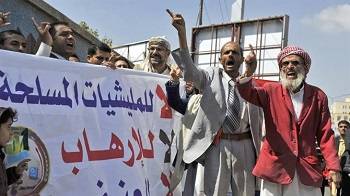Yemen's political blocs have signed an agreement to authorize the president and prime minister-designate to form a government of technocrats, in a bid to end weeks of clashes that have been raging throughout the Arab country.
Yemeni President Abd-Rabbu Mansour Hadi's political party, the General People's Congress, signed the agreement along with Houthi rebels in the capital Sanaa on Saturday, in the presence of UN Special Envoy Jamal Benomar.
Al Jazeera's Omar Al Saleh, reporting from Sanaa, said residents would be watching closely to see how Houthis in general reacted to the agreement.
"This is a significant development that could really see an end to the crisis that is gripping this country," he said.
Tribal leaders have been meeting in the capital for weeks to find a solution to the political crisis amid intense clashes in major towns and cities across the Arab world's poorest nation.
Mass protests erupted earlier this year after the government announced a sharp rise in fuel prices in an effort to curb its budget deficit.
The Houthis, who have been accused of having links with Iran, capitalized on the widespread discontent, converging on the capital.
Since seizing Sanaa, the Shia rebels have captured a number of key cities and towns, waging battles with opposing tribes and fighters.
Renewed clashes
Saturday's announcement came as the Houthis launched a deadly attack on one of the provincial headquarters of their biggest political rivals, killing four guards in overnight clashes.
The Houthis attacked the headquarters of the Islamist Islah Party in Ibb province on Saturday, and reportedly detained 25 of the party's supporters after surrounding the building.
They also blew up a nearby dispensary belonging to Islah, forcing hundreds of people to flee the area, officials said on condition of anonymity.
The rebel fighters have won a string of successes on the battlefield across the country and view Islah, Yemen's biggest Sunni party, as a possible ‘threat’ to their gains.
The Houthis took the city of Ibb last month after easily overrunning Sanaa in September in a surprise offensive that also saw them capture the Red Sea port city of Hodeidah, Shia-populated Dhamar and a number of other key cities.
The rebels, who hail from the northern highlands and champion the interests of the Zaidi community, have been able to expand their territory largely unchallenged by government forces, with the only real resistance coming from Sunni tribes.
The Houthis have taken advantage of the lack of stability since autocratic President Ali Abdullah Saleh was ousted in 2012 following a year-long uprising.
PHOTO CAPTION
Yemeni activists hold a banner reading in Arabic: 'No to armed militias, No to terrorism, No to Violence' while shouting slogans during a rally against the control by Shiite Houthi fighters of the country’s main cities, in Sana'a, Yemen, 01 November 2014.
Al-Jazeera


 Home
Home Discover Islam
Discover Islam Quran Recitations
Quran Recitations Lectures
Lectures
 Fatwa
Fatwa Articles
Articles Fiqh
Fiqh E-Books
E-Books Boys & Girls
Boys & Girls  Articles
Articles










